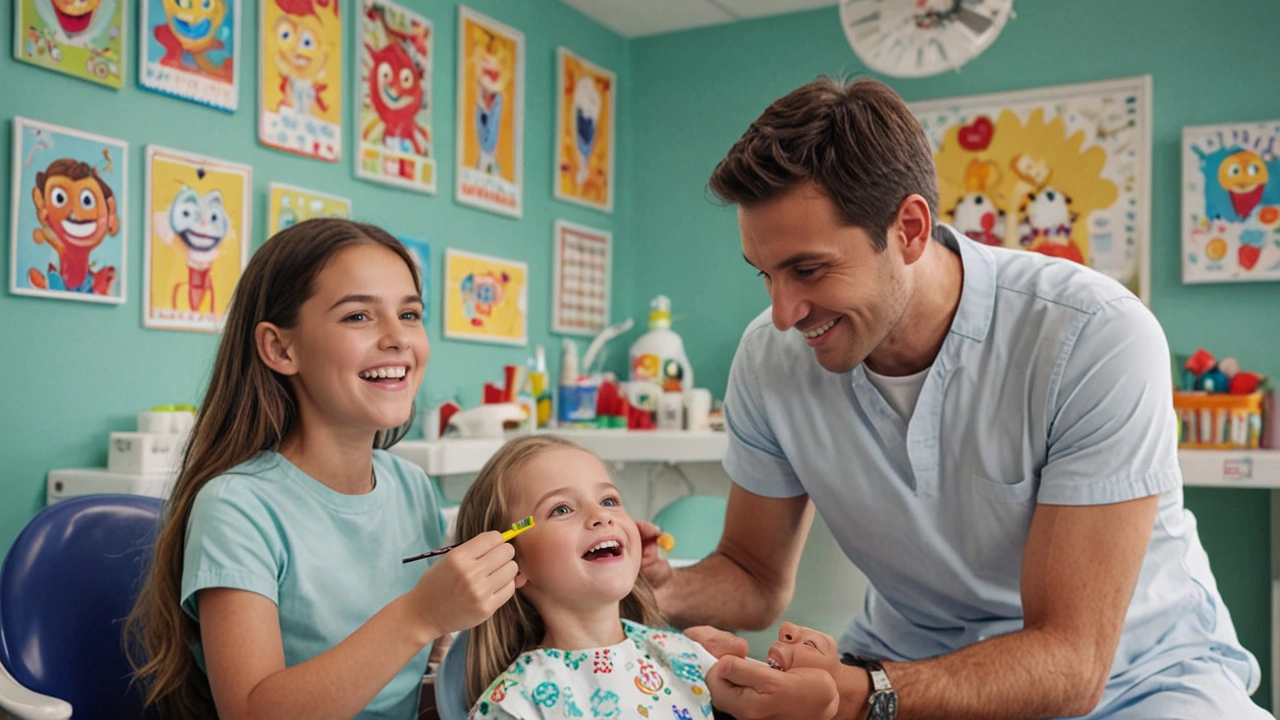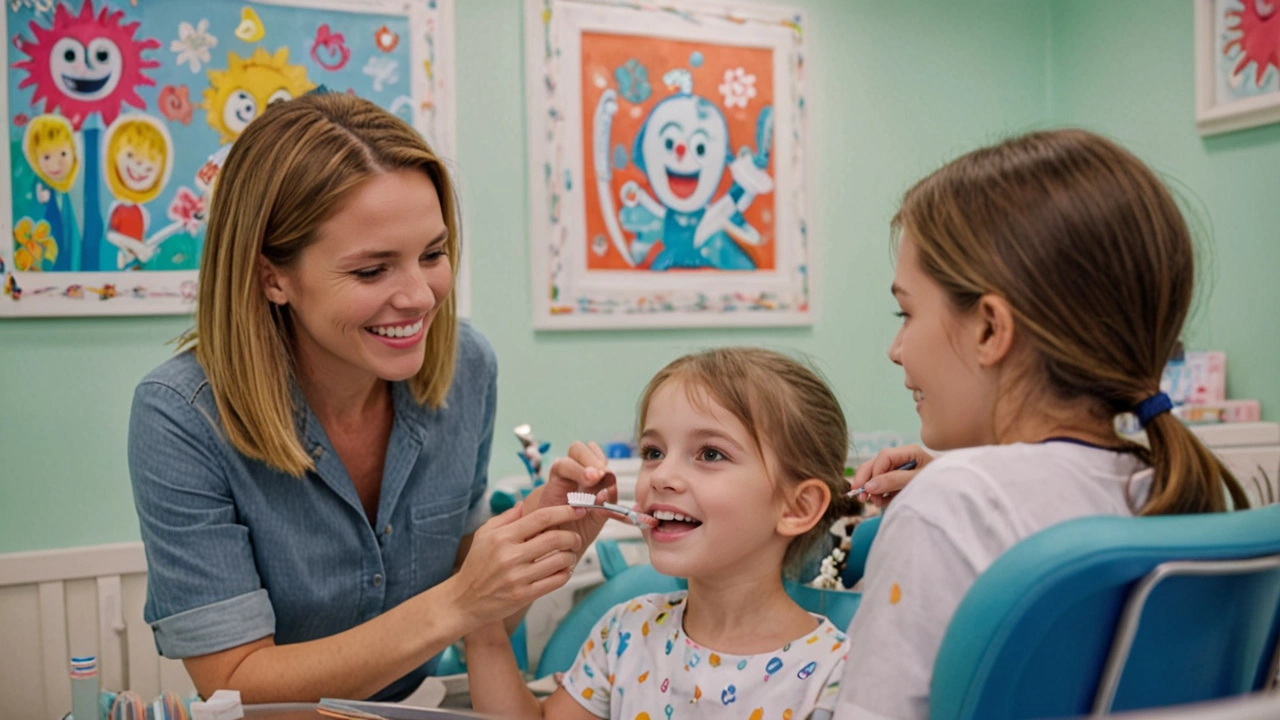
Pediatric dentistry isn't just about fixing cavities; it's about laying the foundation for lifelong oral health. Many parents might think dental care only becomes important once the child has all their teeth, but the journey to a healthy smile begins much earlier.
The first section will explain what pediatric dentistry is, emphasizing its role in comprehensive oral health care for children from infancy through the teen years. We will cover what makes this field distinct and crucial.
The next part will highlight the importance of early dental visits. Starting dental check-ups as soon as the first tooth appears can help detect potential issues early and set the stage for a lifetime of healthy habits.
In the third section, we’ll dive into practical strategies and tips for maintaining your child's oral health, including brushing techniques, diet, and routine dental check-ups.
Finally, we’ll explore the long-term benefits of pediatric dental care, from boosting confidence with a bright smile to preventing costly dental procedures in the future. Establishing strong dental health habits early on can significantly reduce the risk of serious dental problems later in life.
- What is Pediatric Dentistry
- Importance of Early Dental Visits
- Preventive Strategies and Tips
- Long-Term Benefits of Pediatric Dental Care
What is Pediatric Dentistry
Pediatric dentistry is a specialized field of dental care focused on the oral health of infants, children, and adolescents. It’s essential because children’s teeth and gums are still developing, making them more susceptible to specific issues. A pediatric dentist undergoes additional years of training beyond dental school to understand the unique requirements of growing children.
This branch of dentistry is not merely about treating issues as they arise, but primarily about preventing problems before they start. The goal is to ensure children develop healthy oral hygiene habits early in life. This involves regular check-ups, cleanings, and educating both parents and children on proper dental care techniques.
Pediatric dentists are adept at managing behaviors and providing a comfortable environment for children. This approach helps to reduce the anxiety that many kids feel about going to the dentist. Creating a positive dental experience from a young age can lead to a lifetime of better oral health practices.
According to the American Academy of Pediatric Dentistry (AAPD), children should begin visiting a pediatric dentist by their first birthday. Early visits can help identify any potential issues, such as early signs of cavities or misaligned teeth, and address them promptly. This early intervention can prevent minor issues from becoming significant problems later on.
Pediatric dentists also focus on other aspects of dental health, such as the use of dental sealants, fluoride treatments, and space maintainers if a child loses a tooth prematurely. These preventive measures can safeguard against decay and maintain the proper alignment of teeth as they grow.
Pediatric dentistry is dedicated to the oral health of children from infancy through the teen years. Regular check-ups are crucial for keeping your child in excellent oral health. - American Academy of Pediatric Dentistry
One fascinating aspect of pediatric dentistry is that it often involves educating parents as much as children. Parents play a significant role in their child’s oral health, so understanding the best practices for brushing, flossing, and dietary choices is crucial. This collaborative approach ensures that children receive consistent dental care both at home and at the dentist's office.
Pediatric dentistry is a preventive and proactive approach to oral health that can have a lasting impact on a child's future well-being. By starting dental care early and remaining vigilant, parents can help their children avoid many of the common dental issues that can arise as they grow older.

Importance of Early Dental Visits
Starting dental visits early in childhood is crucial for a multitude of reasons. The American Academy of Pediatric Dentistry recommends that children have their first dental visit by age one or within six months of getting their first tooth. While this might seem premature to some, catching potential dental problems early can prevent more serious issues down the line.
One of the key benefits of early dental visits is the opportunity for dentists to monitor the development of a child's teeth and jaws. This monitoring ensures that everything is growing as it should, which helps in identifying any anomalies at an early stage. Early detection and intervention can make a significant difference in treatments, often simplifying them and making them less invasive. For example, if a child's teeth are coming in crooked or if they have malocclusion, early visits can catch these issues before they become more problematic and require extensive orthodontic work later.
Another critical aspect of early dental visits is education. These appointments give the dentist a chance to educate both the child and the parents on the best practices for maintaining oral health. Learning the proper techniques for brushing and flossing, understanding the impact of diet on dental health, and recognizing the signs of potential problems can empower families to take better care of their children's teeth. This education isn't just a one-time thing; it evolves as the child grows, adapting to the changes in their mouth and their lifestyle.
"The earlier a child begins to get regular dental check-ups, the healthier their mouths will stay throughout their lives," says Dr. Mary Hayes, a pediatric dentist and spokesperson for the American Dental Association.
Preventing dental anxiety is another benefit of early visits. Many children (and adults) have a fear of the dentist, often stemming from negative early experiences or the unknown nature of dental procedures. By starting dental visits early, children become familiar with the environment, the instruments, and the process itself. This familiarity can make the visits less intimidating and build a positive relationship with dental care, which can last a lifetime.
Moreover, early dental visits allow for the application of preventive treatments such as fluoride varnishes and dental sealants. These treatments can significantly reduce the risk of cavities, which are the most common chronic disease in children. According to the Centers for Disease Control and Prevention (CDC), tooth decay affects more than one in five children aged 2-5 years. Early application of these preventive measures can protect teeth by strengthening the enamel and sealing out decay-causing bacteria.
In essence, early dental visits are a proactive step toward ensuring a child's dental health. They help catch problems early, provide essential education, reduce anxiety, and apply preventive treatments, all of which contribute to strong, healthy teeth and gums. Waiting until an issue arises can lead to more complex, costly, and often painful treatments. Therefore, making that first appointment as soon as possible can make all the difference in your child’s long-term dental health.

Preventive Strategies and Tips
Healthy teeth start with good habits early in life. Pediatric dentistry focuses not just on treating dental issues but preventing them before they even start. Getting kids to establish solid oral hygiene habits is key to avoiding dental problems down the road. Here are some vital strategies and tips to consider.
First and foremost, regular brushing and flossing are the bedrock of good dental health. Begin brushing your child’s teeth as soon as the first tooth appears. Use a small, soft-bristled toothbrush and a smear of fluoride toothpaste. For children under three, a rice-sized amount of toothpaste is sufficient, whereas a pea-sized amount works for those aged three to six. Flossing should start once your child has two teeth that touch each other. These daily routines help in removing plaque, the main cause of tooth decay and gum disease.
Diet also plays a crucial role in dental health. Limit sugary snacks and drinks as much as possible. Sugary foods contribute significantly to tooth decay. Opt instead for healthy snacks such as fruits, vegetables, and dairy products, which provide necessary nutrients for growing teeth. Encouraging water as the drink of choice helps to rinse out food particles and reduce plaque buildup.
Regular dental check-ups are another key element in preventing dental issues. Dentists can detect potential problems early like cavities or misaligned teeth and recommend timely treatments. The American Academy of Pediatric Dentistry recommends that children see a dentist by the age of one or within six months after their first tooth comes in. These visits can also help to get children accustomed to the dental environment, thus minimizing dental anxiety in the future.
There are also preventive treatments, like fluoride applications and dental sealants, which can significantly reduce the likelihood of cavities. Fluoride strengthens tooth enamel, making it more resistant to decay. Dental sealants, on the other hand, are thin, protective coatings placed on the chewing surfaces of the back teeth, where decay often starts. According to the Center for Disease Control and Prevention (CDC), dental sealants can prevent 80% of cavities in the first two years and continue to protect against 50% of cavities for up to four years.
The role of parents cannot be overstated in instilling these good habits. Supervising your child while they brush and floss, and creating a fun routine around it, can make the experience enjoyable for them. Sometimes, having a reward system for consistent oral hygiene practices can also motivate children.
“Prevention is always better than cure, especially when it comes to children’s dental health. Establishing these habits early in life is essential,” says Dr. John Brown, a renowned pediatric dentist.
Lastly, educating your child about the importance of good dental hygiene is crucial. Books, videos, and even games can make learning about teeth care engaging. When children understand why they need to brush and floss, they're more likely to do it consistently. Adequate education can make a world of difference in maintaining that sparkling, healthy smile they'll carry into adulthood.

Long-Term Benefits of Pediatric Dental Care
The advantages of investing in pediatric dental care go well beyond the immediate effects of having clean and healthy teeth. One of the most significant benefits is the establishment of a strong foundation in dental hygiene. When children are taught the importance of brushing and flossing from an early age, they are more likely to carry these habits into adulthood, markedly reducing their risk of gum disease and tooth decay later in life.
Another critical benefit is early detection and treatment of dental problems. Pediatric dentists are trained to spot issues that may not be apparent to the untrained eye. They can identify malocclusions, or misaligned teeth, at a young age and recommend corrective treatments that are less invasive and more effective than treatments required later. Early intervention can save a child from a lifetime of dental discomfort and expensive orthodontic work.
"Establishing a good dental routine early on is akin to providing children with a valuable lifelong tool," says Dr. Sarah Thompson, a renowned pediatric dentist. "It not only boosts their confidence but also substantially lowers their chances of experiencing severe dental issues in the future."
Moreover, pediatric dental care helps in building a child’s confidence and self-esteem. A bright and healthy smile can significantly impact a child’s social interactions and self-worth. Children who feel good about their teeth are more likely to smile and engage socially, which is essential for psychological development. Confidence in one's appearance begins at a young age, and regular dental visits can help ensure children feel proud of their smiles.
The importance of diet cannot be overstated. Pediatric dentists educate both parents and children on the critical role that a balanced diet plays in dental health. They emphasize the dangers of sugary snacks and drinks, which can lead to cavities and other dental issues. By understanding these dietary impacts early, children can make healthier choices that benefit their overall health.
Preventive care is another cornerstone of pediatric dentistry. Regular check-ups and cleanings help keep teeth and gums in optimal condition. Preventive measures such as fluoride treatments and dental sealants can protect children’s teeth from decay. These treatments are simple and painless but have long-lasting effects. Dental sealants, for instance, can protect the chewing surfaces of the back teeth from decay for up to a decade.
Pediatric dentists also offer guidance on habits such as thumb sucking and pacifier use, which if prolonged can affect the alignment of teeth. By addressing and correcting these habits early, parents can avoid more complex dental issues later.
Social skills and a positive outlook on dental care are often overlooked benefits of pediatric dentistry. Regular visits to the dentist can demystify the process and help children feel comfortable and less anxious about dental care as they grow older. A positive experience with the dentist during childhood can lead to a lifetime of proactive dental health.
Statistics support the significance of these early interventions. According to the American Academy of Pediatric Dentistry, children who receive regular dental care are 50% less likely to miss school due to dental-related issues. They are also more likely to have better oral health as they transition into adulthood.
In summary, pediatric dental care is a vital investment in your child's overall well-being. By fostering good dental habits, offering preventive care, and ensuring early intervention, pediatric dentistry can pave the way for a lifetime of healthy smiles and fewer dental issues. The benefits are far-reaching and can positively impact not just dental health but a child’s confidence, social life, and academic performance as well.
Write a comment
More Articles

Everything You Need to Know About Full Ceramic Veneers: A Comprehensive Guide
In this comprehensive guide, we delve into the world of full ceramic veneers, a popular solution for those seeking to enhance their smile. From understanding what full ceramic veneers are, to exploring their benefits, and even diving into the procedure of getting them, this article aims to provide a thorough understanding of this dental aesthetic choice. We also cover the care and maintenance required to ensure the longevity of your veneers, alongside addressing common misconceptions. Whether you're considering veneers or simply curious about them, this article offers valuable insights and practical advice.

Why are my teeth tingling?
Have you ever wondered, "why are my teeth tingling?" If so, this post is here to help. It's a unique sensation that can put us on edge, and sometimes it can be difficult to pinpoint the underlying cause. Let's delve into some explanations about what might be causing your teeth to tingle, potential oral health issues you need to look out for, and what steps to take to alleviate this strange sensation. Together, we'll make those tingly teeth a thing of the past!

How to replace missing teeth?
Hello! I've crafted this blog to shed some light on replacing missing teeth. We'll discuss options such as dental implants and dentures, their advantages, possible concerns, and what to expect during the process. Trust me, it's not as scary as it sounds! This guide was written with oral health in mind, we'll explore how to regain that confident smile with a healthy set of teeth.



